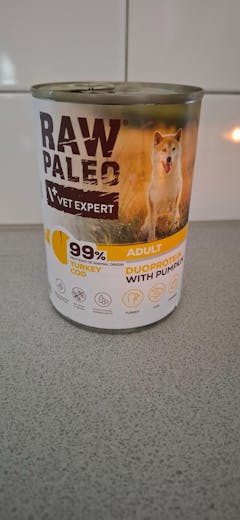Valpfoder
Valpfoder: Grundstenen för en Sund Tillväxt och Ett Långt Hundliv
Att välkomna en valp till familjen är en fantastisk upplevelse, och som nybliven valpägare är det en av de viktigaste uppgifterna att säkerställa att din lilla vän får den bästa möjliga starten i livet. Näringen spelar en avgörande roll under valptiden, då de växer otroligt snabbt och bygger grunden för sin framtida hälsa. Valpfoder är speciellt utformat för att möta valpens unika och intensiva näringsbehov. På Zoostar.se hittar du ett noga utvalt sortiment av valpfoder från ledande märken, anpassade för valpar av alla raser och storlekar.
Varför Din Valp Behöver Specifikt Valpfoder
Valpar är inte bara små vuxna hundar; de är i en intensiv tillväxtfas som kräver en mycket specifik näringsbalans. Valpfoder skiljer sig från vuxenfoder på flera avgörande punkter:
- **Högre Energiinnehåll:** Valpar är otroligt aktiva och har en mycket snabb metabolism. De behöver mer kalorier och fett per kilo kroppsvikt jämfört med vuxna hundar för att stödja sin snabba tillväxt och höga energinivå.
- **Ökat Proteininnehåll:** För att bygga starka muskler, organ och vävnader kräver valpar en större mängd högkvalitativt protein. Valpfoder har en högre andel protein för att möta detta behov.
- **Balanserad Mineralprofil:** En av de mest kritiska aspekterna är den exakta balansen av mineraler som kalcium och fosfor. Dessa är avgörande för en sund skelettutveckling. För stora raser är det särskilt viktigt med en kontrollerad tillväxt för att undvika problem som osteokondros (OCD) och andra ledproblem.
- **Berikat med DHA:** Många moderna valpfoder är berikade med DHA (dokosahexaensyra), en omega-3-fettsyra som är vital för utvecklingen av hjärnan och synen hos valpar. DHA finns naturligt i tikmjölk men är ett viktigt tillskott i ett komplett valpfoder.
- **Lättsmält:** Valpars matsmältningssystem är känsligare. Valpfoder är ofta formulerat med högkvalitativa, lättsmälta ingredienser och ibland med prebiotika och probiotika för att stödja en hälsosam tarmflora.
- **Mindre Foderkulor:** Speciellt valptorrFoder har ofta mindre foderkulor som är lättare för små valpmunnar att tugga och svälja.
Välja Rätt Valpfoder Baserat på Rasstorlek
Valpar av olika raser växer i olika takt och uppnår sin vuxenstorlek vid olika åldrar. Därför finns valpfoder ofta anpassat efter förväntad vuxenstorlek:
- **Valpfoder för Små Raser:** Dessa foder är ofta energitäta och har små foderkulor, anpassade för små hundar som växer snabbt men blir små i storlek.
- **Valpfoder för Mellanstora Raser:** Balanserat foder som stödjer en jämn tillväxttakt.
- **Valpfoder för Stora och Jätteraser:** Mycket viktigt med foder som främjar en kontrollerad tillväxt för att minska risken för skelett- och ledproblem. Dessa foder har ofta en lägre energitäthet per portion och en noggrant balanserad kalcium/fosfor-kvot. Stora raser behöver ofta äta valpfoder (eller ett särskilt juniorfoder för stora raser) längre, ofta upp till 18-24 månaders ålder.
När Ska Din Valp Byta till Vuxenfoder?
Tidpunkten för övergång från valpfoder till vuxenfoder beror, som nämnts, på rasstorlek:
- **Små raser:** Vanligtvis runt 9-12 månaders ålder.
- **Mellanstora raser:** Runt 12-15 månaders ålder.
- **Stora och jätteraser:** Ofta så sent som 18-24 månaders ålder, eller till och med upp till 30 månader för de allra största.
Övergången bör alltid ske gradvis över 7-10 dagar genom att successivt blanda in det nya fodret med det gamla för att undvika magbesvär. Rådgör alltid med din veterinär eller uppfödare för att få en exakt rekommendation anpassad för just din valp.
Torrfoder, Våtfoder eller Kombinationsfoder för Valpen?
På Zoostar.se erbjuder vi olika typer av valpfoder för att passa din valps preferenser och dina behov:
- **ValptorrFoder:** Det vanligaste och mest praktiska alternativet. Lätt att dosera, god hållbarhet och bidrar till viss mekanisk rengöring av tänderna. Kommer i mindre foderkulor.
- **ValpVåtfoder:** Mycket smakligt och kan vara bra för valpar som behöver extra vätska eller som är lite kräsna. Ofta lättare att tugga för små valpar eller de med känsliga tänder.
- **Kombinationsfoder (Mix-utfodring):** Många väljer att blanda torrfoder med en mindre mängd våtfoder för att öka aptitligheten och vätskeintaget. Kom ihåg att justera mängderna så att valpen får rätt totalt kaloriintag.
För de allra yngsta valparna, eller vid behov av tillskott, har vi även mjölkersättning och valpvälling som ett näringsrikt komplement.
Viktiga Näringsämnen i Valpfoder
Ett komplett valpfoder innehåller en noggrann balans av:
- **Proteiner:** För muskel- och vävnadsutveckling. Källor som kyckling, lamm, lax.
- **Fetter:** Som en koncentrerad energikälla och för upptag av fettlösliga vitaminer. Viktigt med omega-3 (DHA, EPA) och omega-6 fettsyror för hud, päls, hjärna och syn.
- **Kolhydrater:** För energi. Ofta från lättsmälta källor som potatis, sötpotatis eller ris. För känsliga valpar kan spannmålsfritt valpfoder vara ett alternativ.
- **Vitaminer och Mineraler:** I rätt proportioner för att stödja skelettutveckling, immunförsvar och allmän hälsa.
- **Fibrer:** För en sund matsmältning och tarmfunktion.
På Zoostar.se är vi stolta över att erbjuda ett brett utbud av högkvalitativt valpfoder. Utforska vårt sortiment av hundmat och foder, veterinärfoder till hund, och även hundgodis och tuggbitar som kan användas som träningsbelöningar för din valp. Ge din valp den bästa möjliga starten i livet med rätt näring från Zoostar.se!
Vanliga frågor om Valpfoder
Här besvarar vi några av de mest frekventa frågorna vi får angående valpfoder.
Varför är valpfoder viktigt och hur skiljer det sig från vuxenfoder?
Valpar är inte bara små hundar; de är individer i en intensiv tillväxtfas som ställer unika krav på sin kost. Valpfoder är speciellt utformat för att möta dessa specifika näringsbehov under deras första och mest kritiska levnadsår. Att förstå skillnaderna mellan valpfoder och vuxenfoder är avgörande för att ge din valp den bästa möjliga starten i livet. Varför är valpfoder viktigt? Valpar växer otroligt snabbt, särskilt under de första månaderna. Denna snabba tillväxt kräver en betydande mängd energi och specifika näringsämnen för att bygga starka ben, muskler, ett fungerande immunförsvar och ett välutvecklat nervsystem. Ett valpfoder av hög kvalitet är avgörande för att stödja denna utveckling och förebygga framtida hälsoproblem. Hur skiljer sig valpfoder från vuxenfoder? Huvudskillnaderna mellan valpfoder och vuxenfoder ligger i näringsprofilen, det vill säga mängden och balansen av protein, fett, kolhydrater, vitaminer och mineraler. 1. Högre proteininnehåll: Valpar behöver en större mängd högkvalitativt protein för att bygga muskler, organ och andra vävnader. Valpfoder innehåller vanligtvis en högre andel protein än vuxenfoder. 2. Högre fetthalt och kaloriinnehåll: Valpar är mycket aktiva och har en snabb metabolism, vilket kräver mer energi. Valpfoder är mer energitätt, med en högre fetthalt, för att tillgodose deras höga energibehov utan att de behöver äta orimligt stora mängder foder. 3. Specifik mineralbalans (kalcium och fosfor): Detta är en av de mest kritiska skillnaderna, särskilt för stora raser. Valpfoder är noggrant balanserat med avseende på kalcium och fosfor för att stödja en sund benutveckling. För mycket eller för lite av dessa mineraler kan leda till skelettproblem, särskilt hos snabbväxande raser. Denna balans är inte lika kritisk i vuxenfoder. 4. Berikat med vitaminer och spårämnen: Valpfoder innehåller ofta högre nivåer av vissa vitaminer och spårämnen som är viktiga för tillväxt, immunförsvar och nervsystemets utveckling. Exempel är vitamin D för kalciumupptag, B-vitaminer för energiomsättning, samt antioxidanter för immunförsvaret. 5. Tillsatser för hjärn- och ögonutveckling: Många moderna valpfoder är berikade med DHA (dokosahexaensyra), en omega-3-fettsyra som är viktig för utvecklingen av hjärnan och synen. DHA finns naturligt i tikmjölk men tillsätts ofta i valpfoder för att fortsätta stötta denna utveckling. 6. Lättsmälthet: Valpar har känsligare matsmältningssystem. Valpfoder är ofta formulerat för att vara lättsmält, med högkvalitativa ingredienser och ibland med prebiotika och probiotika för att stödja en hälsosam tarmflora. 7. Storlek på foderkulor: Valpfoder, särskilt torrfoder, har ofta mindre foderkulor som är lättare för små valpmunnar att tugga och svälja. När byter man från valpfoder till vuxenfoder? Tiden för övergången varierar beroende på ras och storlek: - Små raser: Kan ofta byta till vuxenfoder vid 9-12 månaders ålder. - Mellanstora raser: Runt 12-15 månaders ålder. - Stora och jätteraser: Behöver ofta valpfoder (eller särskilt anpassat juniorfoder för stora raser) längre, upp till 18-24 månaders ålder, på grund av deras långsammare och mer utdragna tillväxtperiod. Rådgör alltid med din veterinär eller uppfödare för att få råd om när det är bäst att byta för just din valp. Att välja rätt valpfoder är en av de viktigaste investeringarna du kan göra i din hunds framtida hälsa och välbefinnande. På Zoostar.se hittar du ett brett utbud av valpfoder anpassat för olika raser och behov.
Hur länge ska min valp äta valpfoder och när är det dags att byta till vuxenfoder?
Att veta hur länge din valp ska äta valpfoder och när det är dags att byta till vuxenfoder är en vanlig fråga bland nya valpägare. Tiden för övergången är inte densamma för alla hundar, utan beror primärt på hundens ras och dess förväntade vuxenstorlek. Varför rasstorleken spelar roll: Hundar av olika raser växer i olika takt och uppnår sin fulla vuxenstorlek vid olika åldrar. - Små raser (t.ex. Chihuahua, Yorkshireterrier, tax): Dessa raser växer snabbt och når sin vuxenstorlek relativt tidigt. De kan ofta byta till vuxenfoder runt 9-12 månaders ålder. - Mellanstora raser (t.ex. Cocker Spaniel, Border Collie, Labrador): Dessa raser tar lite längre tid på sig att växa klart. En övergång till vuxenfoder sker vanligtvis runt 12-15 månaders ålder. - Stora och jätteraser (t.ex. Schäfer, Grand Danois, Leonberger): Dessa raser har en mycket långsam och utdragen tillväxtperiod, särskilt vad gäller skelett och leder. Det är avgörande att de får rätt näring under hela denna period för att undvika tillväxtrubbningar. De bör äta valpfoder (eller specialformulerat juniorfoder för stora raser) fram till 18-24 månaders ålder, och ibland till och med upp till 30 månader för de allra största raserna. Syftet med att fortsätta med valpfoder längre för stora raser är att säkerställa en kontrollerad tillväxt. Ett för snabbt intag av energi och kalcium kan leda till problem med skelett- och ledutvecklingen hos snabbväxande, tunga hundar. Tecken på att det är dags att byta: Förutom åldern kan du också hålla utkik efter andra tecken som indikerar att din valp närmar sig sin vuxenstorlek och mognad: - Tillväxtkurvan planar ut: Valpen har slutat växa i höjd och börjar istället fylla ut sig och bygga muskler. - Vikten stabiliseras: Valpens vikt ökar inte längre i samma takt som tidigare. - Beteendemässig mognad: Valpen kan börja uppvisa mer vuxna beteenden, även om mental mognad ofta kommer senare än fysisk mognad. Hur man byter foder – steg för steg: En foderomställning bör alltid ske gradvis för att undvika magbesvär. En plötslig förändring kan leda till diarré eller kräkningar. Följ dessa steg under 7-10 dagar: - Dag 1-2: 75% valpfoder, 25% vuxenfoder - Dag 3-4: 50% valpfoder, 50% vuxenfoder - Dag 5-6: 25% valpfoder, 75% vuxenfoder - Dag 7 och framåt: 100% vuxenfoder Håll koll på valpens avföring och allmänna välbefinnande under övergången. Om den får magbesvär, sakta ner processen och låt övergången ta längre tid. Rådgör alltid med din veterinär: Det bästa rådet får du alltid från din veterinär eller uppfödare. De känner till din valps specifika ras och individuella förutsättningar och kan ge dig den mest exakta rekommendationen för när och hur du ska byta foder. På Zoostar.se har vi ett stort utbud av valpfoder för alla raser och storlekar, samt vuxenfoder för när det är dags för din valp att ta nästa steg i sin kost.
Kan jag ge min valp torrfoder, våtfoder eller en kombination?
När det kommer till utfodring av valpar finns det flera alternativ: torrfoder, våtfoder eller en kombination av båda. Varje typ har sina egna fördelar, och det bästa valet beror ofta på valpens individuella preferenser, hälsa, och även din egen livsstil. Det viktigaste är att oavsett vilken typ du väljer, så är det ett komplett och näringsmässigt balanserat valpfoder som är anpassat för valpars specifika behov. Valpfoder kan vara: 1. Torrfoder (kibble): Detta är det vanligaste valet för valpar. Fördelar: - Kostnadseffektivt: Ofta mer ekonomiskt i längden än våtfoder. - Bekvämt: Lätt att mäta upp, förvara och servera. - Främjar tandhälsa: Krustigheten i torrfodret kan bidra till att skrapa bort plack från tänderna. - Längre hållbarhet: Öppnade säckar håller sig fräscha längre än öppnade våtfoderburkar. - Träning: Enkelt att använda som belöning under träning. - Finns i specifika storlekar: Många valpfoder kommer i mindre bitar som är lätta för valpar att tugga. Nackdelar: - Lägre vatteninnehåll: Valpen måste dricka tillräckligt med vatten separat. - Vissa valpar kan vara petiga: Vissa valpar föredrar inte den torra texturen. 2. Våtfoder (konserverat eller i påse): Våtfoder är ofta mycket aptitligt för valpar. Fördelar: - Högt vatteninnehåll: Bidrar till valpens vätskeintag, vilket är bra för njurfunktionen och den allmänna hälsan. - Mycket smakligt: Ofta mer lockande för valpar, särskilt de som är lite kräsna eller har dålig aptit. - Lättare att tugga: Passar valpar med känsliga tänder eller valpar som just har börjat med fast föda. - Lättsmält: Kan vara lättare för valpens känsliga matsmältningssystem. Nackdelar: - Dyrare: Generellt sett dyrare per portion än torrfoder. - Kortare hållbarhet: Måste förvaras i kylskåp efter öppning och konsumeras inom en kort tid. - Mindre bra för tandhälsa: Bidrar inte till tandrengöring på samma sätt som torrfoder. 3. Kombination (Mix-utfodring): Många väljer att kombinera torrfoder och våtfoder, vilket ofta kallas för mix-utfodring. Detta kan vara ett utmärkt sätt att dra nytta av fördelarna med båda typerna. Fördelar: - Ökad aptitlighet: Våtfodret kan göra torrfodret mer lockande. - Ökat vätskeintag: Våtfodret bidrar med extra vätska. - Variation: Ger valpen en mer varierad matupplevelse vad gäller smak och konsistens. - Näringsmässigt komplett: Så länge båda delarna av måltiden är kompletta valpfoder, får valpen all nödvändig näring. Hur man kombinerar: - Du kan servera torrfoder på morgonen och våtfoder på kvällen, eller blanda en mindre mängd våtfoder med torrfodret vid varje måltid. - Viktigt är att du justerar mängden av båda fodertyperna så att valpen får rätt totalt kaloriintag och inte blir över- eller underviktig. Följ tillverkarens rekommendationer för båda fodren och räkna ut den kombinerade mängden. Valpar som nyss har avvänjts från mjölkersättning/valpvälling kan med fördel starta med ett uppblött torrfoder eller rent våtfoder, och sedan gradvis gå över till en torrare konsistens. På Zoostar.se har vi ett brett utbud av både valp-torrfoder och valp-våtfoder, samt mjölkersättning och valpvälling för de allra minsta, så att du kan hitta den bästa lösningen för din valp.
Husdjursprodukter Online
Utforska fler populära hundkategorier
Här hittar du många av våra mest efterfrågade kategorier – från hundfoder och godis till tillbehör, vård och aktivering.
Ledande Fodertillverkare
Populära hundfodermärken
Här hittar du våra mest populära hundfoder – från spannmålsfritt till veterinärfoder. Klicka på ett varumärke för att se hela sortimentet.






